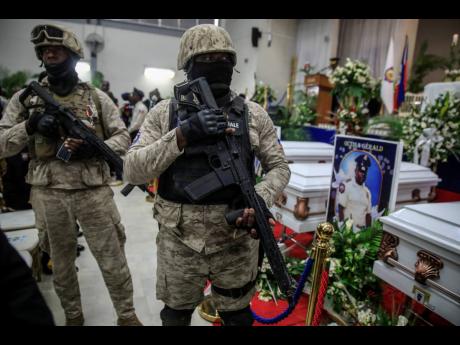Western leaders split on Jamaica’s potential military role in Haitian crisis
WESTERN BUREAU: Business and civic leaders in western Jamaica are divided on whether the Holness administration should send members of the country’s security forces to Haiti as part of a multinational response aimed at restoring public order in the...
WESTERN BUREAU:
Business and civic leaders in western Jamaica are divided on whether the Holness administration should send members of the country’s security forces to Haiti as part of a multinational response aimed at restoring public order in the CARICOM state.
Haiti has been engulfed in bitter political and social turmoil, with gang conflict rife since the July 2021 assassination of President Jovenel Moïse. A cholera outbreak sweeping the country has also claimed the lives of many children amid a surge in malnutrition.
Prime Minister Andrew Holness recently said that Jamaica would be willing to send security personnel to Haiti to help restore stability as part of a mission with other bilateral partners
But some western leaders have told The Gleaner that Jamaica still has some way to go to get a lid on its own crime problem after a bloody 2022 in which 1,498 murders were recorded.
“Charity begins at home, and we must do everything to erase the scourge of crime in this country first,” said Elaine Bradley Allen, president of the Negril Chamber of Commerce and Industry.
She acknowledged that with Haiti’s proximity to Jamaica and long-standing concerns of guns being shipped into the island from the eastern neighbour, the crisis there could affect Jamaica.
“But how about treating the problems here first?” she questioned.
Bishop Oneil Russell, a former violence interrupter with the Peace Management Initiative in Westmoreland, said that he would prefer to see more members of the security forces in his Cooke Street area in Savanna-la-Mar and other communities islandwide.
“What the prime minister needs to do to is to deploy these troops in our country so that we can begin to enjoy peace and stability in our communities. I am not here saying that Haiti does not need help, but there are other countries with greater resources who can help Haiti,” said Russell, who is also pastor of the Ark of the Covenant Holy Apostolic Church.
Meanwhile, James Tweedie, first vice-president of the Trelawny Chamber of Commerce and Industry, said his organisation would support Jamaica’s efforts in helping Haiti as its CARICOM neighbour.
“We have a civic responsibility to help Haiti. If we do nothing, the problem will only spread,” Tweedie told The Gleaner. “But we have to ensure that the other countries in the region also show support. We have to ensure that our response is measured and our needs as a country are not compromised to the point that it affects our own security forces more than at a minimal level.”
Moses Chybar, president of the Westmoreland Chamber of Commerce and Industry, agreed.
“We have a moral responsibility to help those in need. People cannot go about their business there (Haiti) because of the breakdown in law and order. Gangs are taking over,” he said.
“We could assist by sending JDF (Jamaica Defence Force soldiers). They should be given all the necessary equipment to perform their role there,” he added, further suggesting that the soldiers be asked to volunteer for the mission and not be ordered as they would be in harm’s way.

